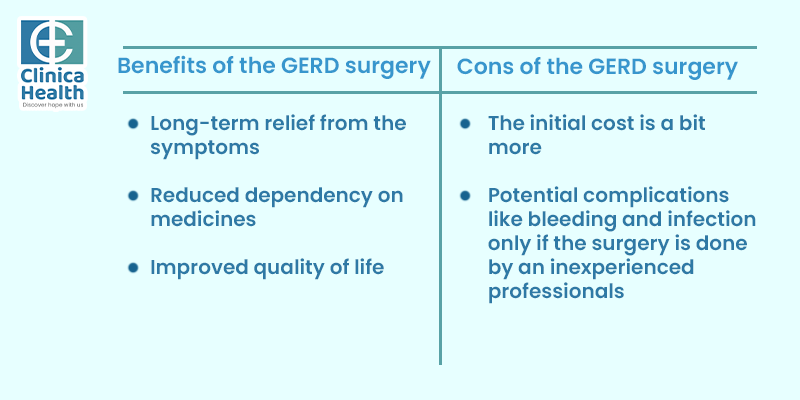-
 Call Now:
8010 552 552
7595 838 844
Call Now:
8010 552 552
7595 838 844
-
 Email Me:
[email protected]
Email Me:
[email protected]
At some point in our lives, we all have experienced acid reflux. It generally goes away by taking antacids. However, when the acid reflux becomes persistent, the condition is known as gastrointestinal esophageal disease (GERD). It is a chronic gastrointestinal disease where acidic stomach contents spill up into the esophagus, resulting in various other related health issues.
Making lifestyle changes is one of the ways to manage the symptoms. But if the symptoms persist, other treatment options like medicines and surgery are recommended. Now, which of these options works best for you depends on various factors such as the severity of your condition, overall health and family history of GERD.
In addition to eating a balanced diet and adopting a healthy life, the two categories of treatment for GERD are medicines and GERD treatment surgery.
Medicines are the first line of treatment for managing the symptoms of GERD. For many patients, treatment with medicines reduces heartburn and other reflux symptoms. However, in patients with severe symptoms, there is partial relief through medications.
The common types include the following
You might experience the following side effects if you regularly consume GERD medicines.
GERD treatment surgery is recommended when medications fail to improve the condition or if the patient wants a permanent cure for the disease. Surgical intervention is also indicated when there is inflammation of the esophagus or benign esophageal stricture.
The common type of GERD surgery is Nissen fundoplication. The procedure is performed via laparoscopic surgery where the top of the stomach is wrapped around the lower part of the esophagus. The surgery helps to tighten the lower esophageal sphincter preventing the reflux of the acid into the esophagus.

Choosing between medicines and GERD treatment surgery requires careful evaluation of the symptoms and the patient’s overall health condition. If you are someone with mild symptoms of GERD, medications are an effective way. However, if your GERD is severe, you might have to undergo surgery to prevent further damage to the esophagus.
It is always essential to consult a certified healthcare provider to determine which option is most suitable for you and whether you are the ideal candidate for surgery.
GERD is a common condition but requires timely medical intervention. Both medicines and surgery have a role to play in the management of GERD. Make sure to consult a skilled and qualified gastro surgeon and be confident for your GERD to get better.